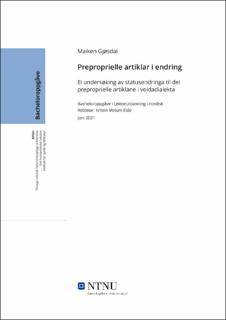Preproprielle artiklar i endring
Bachelor thesis
Permanent lenke
https://hdl.handle.net/11250/2782073Utgivelsesdato
2021Metadata
Vis full innførselSamlinger
Sammendrag
Denne oppgåva dreier seg om dei preproprielle artiklane som tradisjonelt er omtala som obligatoriske i voldadialekta, referert til med forkortinga PPA. Formålet med oppgåva er å etablere kor vidt ei språkleg endring har trede i kraft, der bruken ikkje lenger er obligatorisk. Studien baserer seg på ei kvalitativ spørjeundersøking med to informantgrupper i ulik alder; ungdom i alderen 15-19 og eldre i alderen 78-80. Blant resultata kan ein sjå at medan dei eldre reagerer negativt på manglande PPA og for det meste nyttar PPA sjølve, utløyser ikkje mangel eller tilstadever av PPA nokon reaksjon blant dei yngre, og enkelte av dei vil heller ikkje nytte den. Ut i frå dette konkluderer eg med at bruken av PPA i voldadialekta har gått frå å vere obligatorisk til å bli opsjonell. This thesis is about the preproprial articles which are traditionally regarded as obligatory in the Norwegian dialect of Volda, referred to by the abbreviation PPA. The purpose of the task is to establish whether a linguistic change has occurred, by which the use of the articles is no longer obligatory. The study is based on a qualitative survey with two groups of informants of differing ages: youth between the ages of 15 and 19 and the other made up of elders between the ages of 78 and 80. The results show that while a lack of PPA prompts a negative response from the elders, neither a lack nor presence of PPA prompts any negative reaction from the youth. The elders also chose to use PPA in accordance with the traditional system, while this was not as rigid among the youth. Based on these finds I conclude that the use of PPA in the dialect of Volda has evolved from being obligatory to optional.
